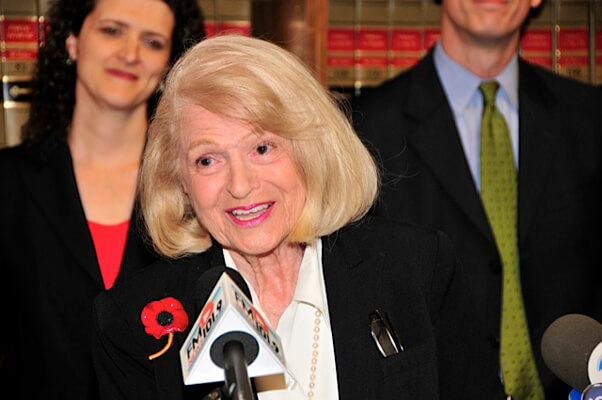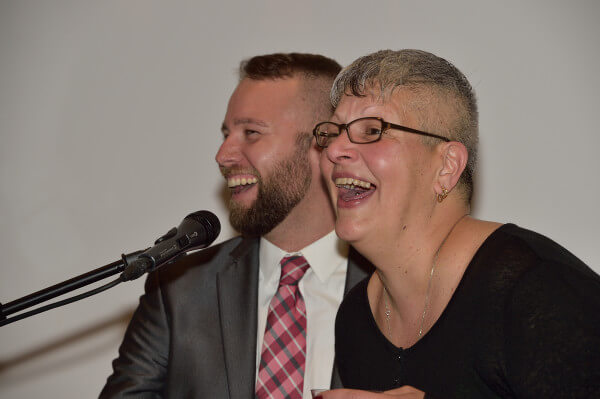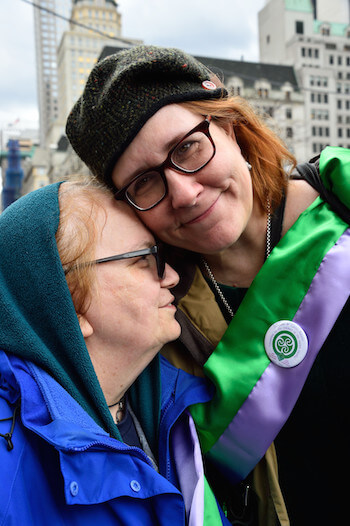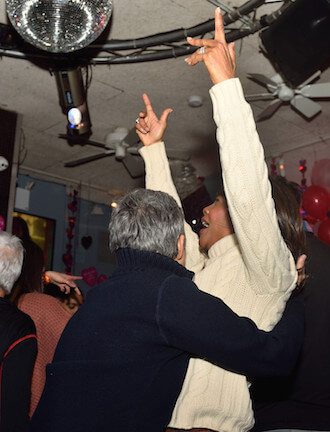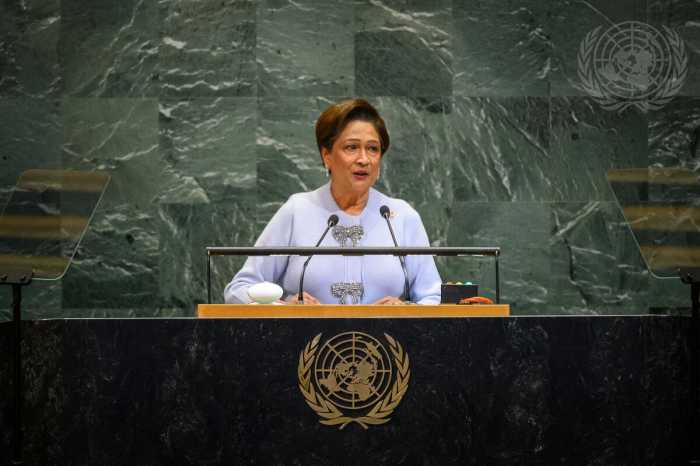Edie Windsor at a June 7 press conference at the New York Civil Liberties Union celebrating her district court victory over DOMA, now affirmed by the Second Circuit Court of Appeals. | DONNA ACETO
A panel of the Manhattan-based US Court of Appeals for the Second Circuit ruled on October 18 that Section 3 of the federal Defense of Marriage Act (DOMA), which bars federal government recognition for same-sex marriages, violates the constitutional guarantee of equal protection of the laws.
Writing for the 2-1 majority, Circuit Chief Judge Dennis Jacobs said, “DOMA’s classification of same-sex spouses was not substantially related to an important government interest,” a fatal flaw given that the court determined the 1996 statute should be held to a heightened level of judicial scrutiny. Judge Christopher Droney joined Jacobs’ opinion.
Dissenting, Judge Chester Straub insisted the court should have applied the less demanding “rational basis” test, under which he concluded the statute was constitutionally defensible. Straub also argued that the US Supreme Court’s 1971 Baker v. Nelson decision –– which, saying there was no substantial federal question at issue, dismissed an appeal from a Minnesota Supreme Court ruling against same-sex marriage –– was a binding precedent requiring reversal of a June district court ruling against DOMA. Straub said the question of whether same-sex couples should be able to marry and have their marriages recognized by the federal government was for the people to decide through the political process.
The court issued its decision with startling speed, considering the case was argued just weeks ago, on September 27. After the district court issued its June decision, attorneys from the American Civil Liberties Union, representing Edith (“Edie”) Windsor in her quest for a refund of estate taxes of more than $360,000 levied after her spouse Thea Spyer died, petitioned the Supreme Court for direct review, bypassing the Second Circuit. The ACLU pointed out that, at 83, Windsor needed an expeditious decision and that the high court had already received petitions to review a similar decision striking down DOMA by the First Circuit Court of Appeals. That case involved same-sex married couples from Massachusetts.
The Bipartisan Legal Advisory Group of the House of Representatives (BLAG) –– which is controlled by Republican Speaker John Boehner and has been defending DOMA in court since the Justice Department announced in February 2011 that Attorney General Eric Holder and President Barack Obama had concluded the statute was unconstitutional –– opposed direct review in the Supreme Court. The Second Circuit panel refused to delay considering the case as the Supreme Court was deciding its response to the ACLU petition.
Early in September, the Obama administration’s solicitor general filed his own petition with the Supreme Court, joining the ACLU’s request for early review in this case. Now the Supreme Court will have the benefit of the Second Circuit’s decision as it considers whether to grant the pending petitions in DOMA cases, which also involve federal district court rulings against the statute in Connecticut and California.
The panel majority’s conclusion that DOMA’s Section 3 is unconstitutional was not surprising and lines up logically with the other recent federal rulings. What is different about this decision is the court’s conclusion that the “heightened scrutiny” test should be used to decide the case. Depending on what happens next, this could make the Second Circuit the first federal circuit to adopt this more searching standard for evaluating claims of sexual orientation discrimination under the constitutional guarantee of equal protection.
Terms such as “heightened scrutiny” and “rational basis” don’t actually appear in the Constitution. They are labels that have been adopted by legal scholars and some Supreme Court justices to describe the analytical approach that federal courts use to determine whether a particular statute or government policy violates the Fifth or 14th Amendment due process and equal protection requirements. Observing that there are winners and losers when a legislature passes a law extending a benefit or regulating an activity, the Supreme Court has found that courts should generally not second-guess the policy judgments of elected legislators, so long as there is some rational basis for what they are doing.
As a result, statutes are usually deemed to be presumptively constitutional, and those who challenge them bear the heavy burden of proving that no rational basis can be put forward to justify what a legislature has done. In the Massachusetts DOMA case, the First Circuit purported to apply this rational basis approach, but in a more demanding way than usual in light of both the history of discrimination gay Americans have suffered at the hands of government and the burden DOMA places on the traditional rights states have enjoyed in defining marriage. The Commonwealth of Massachusetts had filed a companion challenge to the plaintiff couples’ suit, arguing that DOMA required it to discriminate against married gay couples in providing benefits under joint federal-state programs.
The Justice Department’s current position on DOMA is that Section 3 would survive ordinary rational basis review.
When the Justice Department changed its position on the constitutionality of DOMA in February 2011, it did so based on its determination that courts should use the “heightened scrutiny” approach now embraced by the Second Circuit’s new ruling. Since the 1970s, courts have applied that standard to constitutional claims of sex discrimination. When heightened scrutiny is applied, the burden falls on the government to show that a challenged statute actually advances an important governmental interest if the policy discriminates –– that is, establishes a distinction –– based on a “quasi-suspect classification” such as sex.
On September 27, the Justice Department, appearing before the Second Circuit in the Windsor case, argued that DOMA fails that test.
The Supreme Court has examined various factors to determine whether heightened scrutiny should apply –– such as whether there is a history of discrimination concerning a group subject to a classification under a law, whether there are obvious, immutable, or distinguishing characteristics that define the group and are relevant to its ability to participate in society, and whether the group is at a political disadvantage in trying to protect its interests. The ultimate question underlying the analysis of what level of review is appropriate is whether it is likely that a legislative decision was based on prejudice or bias rather than objective policy concerns. The Second Circuit panel majority concluded that gay people qualify for “heightened scrutiny” review on all of these grounds.
The Second Circuit panel’s conclusion that heightened scrutiny applies has significance beyond this decision since –– unless overturned by a larger body of Second Circuit judges sitting “en banc” or by the Supreme Court –– it will binding on all federal district courts in New York, Connecticut, and Vermont and will also be followed by other three-judge panels in the circuit. Under such a standard, constitutional claims of sexual orientation discrimination would have a much greater chance of succeeding.
Presumably, the ACLU will now renew its petition to the Supreme Court, this time asking that it take up and affirm the Second Circuit’s ruling, and the solicitor general will also almost certainly support review, since it is important to the federal government to get a definitive ruling on DOMA’s constitutionality. Having lost, BLAG might seek en banc review by the full bench of the circuit, but events are moving quickly and it seems more likely this case would go directly to the Supreme Court, which rarely denies a request by the solicitor general to review a lower court decision striking down a federal statute. Announcement of how the Supreme Court plans to respond to the pending DOMA petitions for review is widely expected in November.
Roberta Kaplan, a partner at the Manhattan-based law firm Paul, Weiss, Rifkind, Wharton & Garrison, argued the case for Windsor before the Second Circuit, as a cooperating attorney for the ACLU. Numerous amicus briefs were filed on Windsor’s behalf since her district court ruling, including one from New York Attorney General Eric Schneiderman and another from Mayor Michael Bloomberg and City Council Speaker Christine Quinn. Acting Assistant Attorney General Stuart F. Delery argued on behalf of the Justice Department.
BLAG was represented by Paul D. Clement, a former US solicitor general who is now a partner at Washington’s Bancroft law firm. BLAG has exhausted its $1.5 million authorized budget for defending DOMA and will have to seek increased spending authority from the House to continue paying Clement and his law firm.


